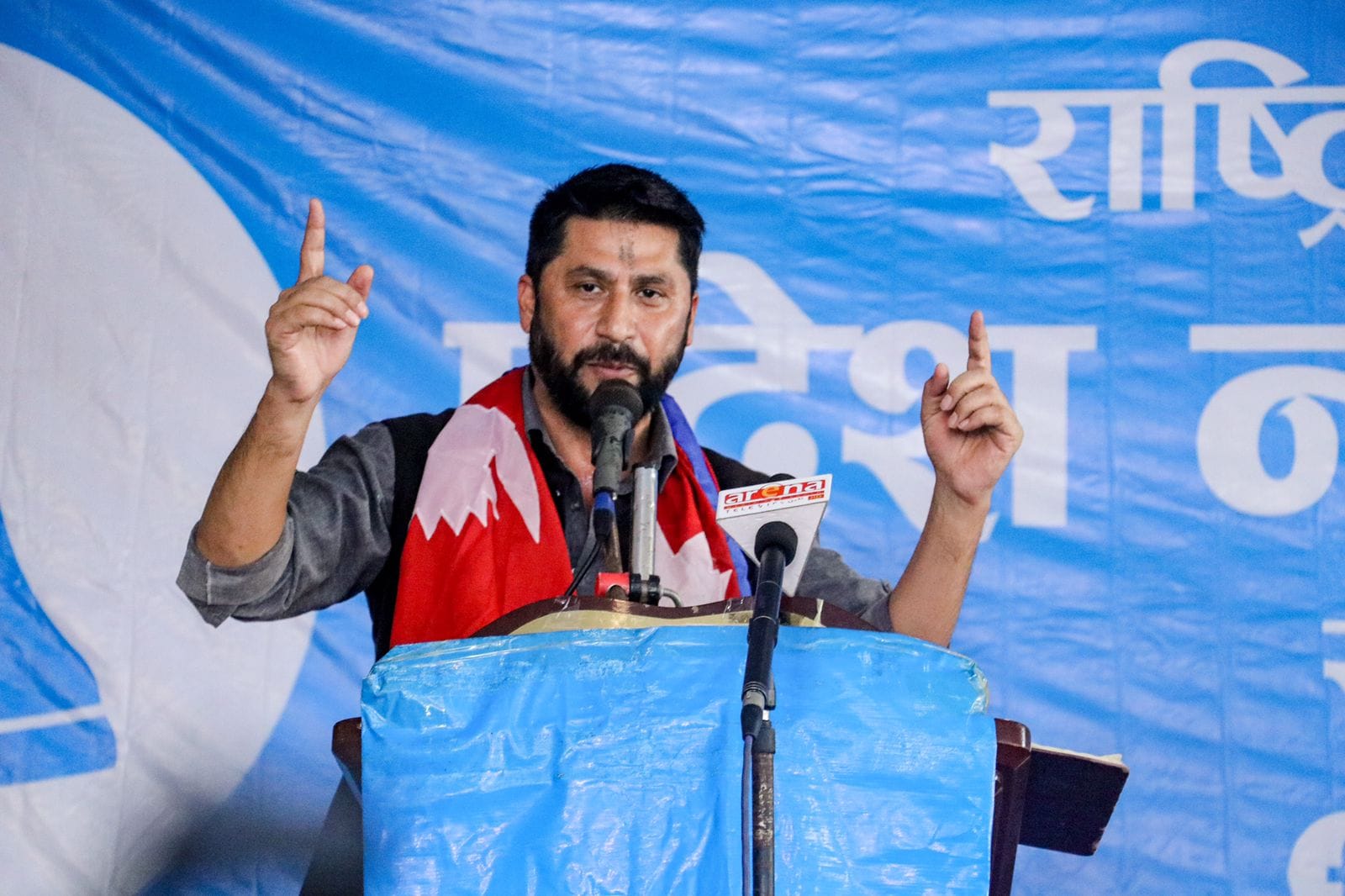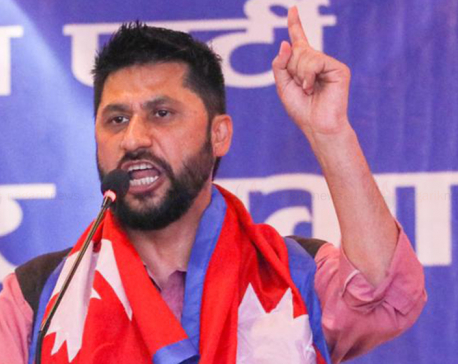
OR
Opinion

Can Populist Rabi and his party survive for another four years? Here's what RSP needs to know.
From the very beginning of the embryonic Rastriya Swatantra Party (RSP), its charismatic chairman Rabi Lamichhane, a former anchor and prominent figure in Nepal, displayed audacity in his leadership, despite lacking a background in politics. The emergence of this alternative political force in the current political landscape rings alarm bells for the established political parties. The significant trust placed in Rabi's party by the general public through the secret ballot does not solely stem from his charisma or the immediate success of his fledgling party, but rather as a response to the accumulation of grievances since the 1990s people's movement. The unprecedented number of frustrated votes cast for the "bell-party" reflects a desire for self-actualization and a rejection of the status quo in the flawed political system. Consequently, RSP and its leader face a substantial challenge in maintaining the same level of integrity and candor they exhibited during the election period, as they navigate the upcoming survival instincts of their party.
As an old Chinese saying goes - “those who win the people's hearts win the country, and those who lose the people's hearts lose the country.” Similarly, in a democracy, the people's support forms the strongest foundation for any political party. It serves as the sacred indicator of a party's survival or extinction. With the emergence of numerous new political parties, traditional political forces fear being marginalized since the general elections of 2022, where the RSP has been successful in gaining the trust of the public. The constant demonstrations by established political parties against the RSP appear counterproductive and indicate that these aging political forces are potentially fading away. There is a popular saying in politics, 'a week is a long time in politics.' Therefore, the RSP has four more years to prove itself, to create significant transformative events through delivery-oriented, performance-oriented, and development-oriented politics, ensuring social fairness and stability. Consequently, the RSP must wholeheartedly dedicate itself to the people and make steady progress by taking credible steps.
Returning to the pre-election period, Rabi Lamichhane, the prominent figure leading the RSP, had declared, “'I may get smeared by the stinking dirt when I opt in, but I will undoubtedly cleanse the filthy politics of corruption.” In line with this vision, the intergenerational conflict has been a significant driving force behind the rapid rise of the RSP in Nepali politics. They championed the 'No, not again' agenda, aiming to dismantle the entrenched gerontocratic empire that perpetuated a revolving-door style of politics. The RSP, a collective of educators, possesses the potential to harness synergistic effects for shared prosperity, evident since the selection process. As an alternative political force, they are determined to establish a political culture in mainstream politics that transforms the landscape of stagnation into one of progress. The party's diverse workforce is committed to a service-oriented networking culture, focused on the welfare of the public and the marginalized. While it may appear challenging for a single party to gain a majority and effectively govern within the parliamentary system, the RSP achieved success in their initial election mission, securing 21 seats. Therefore, the RSP has earned a resounding victory, establishing itself as a symbol of unwavering public trust."
Internationally, there are various epitomes of populism-based political trends in recent years that later on worked as great political endeavors. In India, the Aam Aadmi Party (AAP) was founded in 2012, by a first-time politician, and had no connections with any age-old political party erupted after the historic anti-corruption movement that holds the highest standards of probity by winning 28 seats in the 70-member Delihi assembly election 2013. In Mexico, the National Regeneration Movement (Morena) political party was founded in 2011, by Andres Manuel Lopez, later elected as president in 2018, as a democratic socio-political movement to protest against political corruption, electoral fraud to promote social justice and transparency. In Nigeria, the "All Progressives Congress" (APC) party was founded in 2013, with a focus on promoting anti-corruption and good governance policies. In 2014, after an economic and political crisis in Spain, The Podemos (we can) Party, a small group of radical academics grew rapidly among the dissatisfied voters, and subsequently reached third electoral position in the 2015 general elections that changed European politics. In 2016, Renaissance (French Political Party), founded by Emmanuel Macron, later elected as president in 2017, is focusing on modernizing French politics and promoting economic growth. In Tunisia, the "Heart of Tunisia" party was founded in 2019, winning 38 seats out of 217, in Tunisian parliamentary election 2019 focusing on promoting economic growth and social welfare policies. But, in Nepal, whether this embryonic party can maintain its sustainable success by combating the elitist syndicate system in the long-run is a challenging subject.
The constant ideological debates surrounding this party have paved the way for a promising learning curve, shaping new dimensions and a greater prototype of political culture. Its unexpected performance has captured the trust of the people, but the party must navigate potential pitfalls such as nepotism, politically-blessed appointments, propaganda politics, and internal factionalism, game theory influenced by alliances, blame-game tactics, corruption cycles, unchecked cronyism, money-driven politics, and the political morality of the party chairman, among other challenges. Furthermore, they should be cautious not to fall into the traps set by established political forces, driven by a Realism model that views state and power as ultimate weapons. Additionally, the RSP must excel in dealing with their political adversaries; otherwise, they risk reaching a dead end for the party. The 'existential threat' remains a shared challenge, as it is still uncertain whether this party can withstand or be surpassed by numerous others. By fostering people-to-people connections, prioritizing people-centered politics, and genuinely valuing the concerns of the public, the RSP can ensure its longevity and potentially attain a significant position of power in the years to come. Therefore, it is imperative to reshape Nepal's political culture landscape by introducing an action-oriented organizational culture.
There's a saying that 'Work brings profit, but talk leads to poverty,' highlighting the importance of action for a quintessential party like the RSP to demonstrate its commitment to the nation's well-being. Traditional political parties often make grand promises to the masses before elections, only to prioritize personal gain once in power. Finding integrity in the political landscape has become challenging, as even with prominent leaders in the spectrum, there is a crisis of confidence in our leadership. In this environment of laxity, the RSP represents the ultimate hope. As a troubleshooter, they can take a significant leap toward becoming a legitimate political force with greater sustainability. Aside from internal political conflicts, the party faces the daunting task of navigating high-stakes geopolitical dynamics and trans-boundary interests with enthusiasm. To confront such challenges confidently, the RSP must strengthen itself internally and externally, becoming a formidable force in unexpected situations.
Ultimately, the members of the RSP are intellectually well-equipped to effectively address pressing issues and meet the evolving demands of society in reshaping the political culture. With their astute presence, the stagnant and uninspiring political landscape is gradually transforming into a progressive and creative parliament, establishing a strong foundation for mature democracy. The diverse and unified voices within the RSP must maintain continuous cohesion and take concerted actions to reinforce the unwavering trust of their steadfast supporters over the years. Therefore, both the party chairman, Rabi Lamichhane, and the collective members must exemplify the 'survival of the fittest' mentality, with great determination to uphold the dynamism of the party's working spirit.
You May Like This

Rabi Lamichhane’s supporters becoming increasingly anarchic
KATHMANDU, April 17: A 21-year-old Pratiksha Adhikari from Bharatpur Metropolitan City-11, Bhojahat, Chitwan, has been called names on social media... Read More...

Media persons trying to frame me in passport case: Rabi Lamichhane
KATHMANDU, Feb 5: Rastriya Swatantra Party President Rabi Lamichhane has alleged that a dozen media persons are trying to frame... Read More...

Rabi Lamichhane elected as HoR member from Chitwan-2
CHITWAN, Nov 24: Rastriya Swatantra Party Chairman Rabi Lamichhane has won from Chitwan Constituency-2. He won with a margin of... Read More...








Just In
- NRB to provide collateral-free loans to foreign employment seekers
- NEB to publish Grade 12 results next week
- Body handover begins; Relatives remain dissatisfied with insurance, compensation amount
- NC defers its plan to join Koshi govt
- NRB to review microfinance loan interest rate
- 134 dead in floods and landslides since onset of monsoon this year
- Mahakali Irrigation Project sees only 22 percent physical progress in 18 years
- Singapore now holds world's most powerful passport; Nepal stays at 98th











Leave A Comment